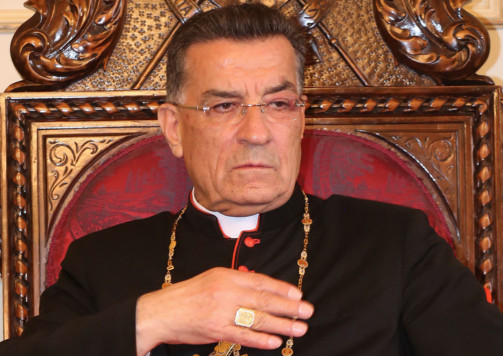
Bkerke: An unprecedented visit by Lebanon’s Maronite Patriarch to the Holy Land has angered the powerful Shiite Muslim movement Hezbollah, a sworn enemy of the Israelis, technically still at war with Lebanon.
Patriarch Beshara Rai’s planned visit is highly sensitive in a country where power is shared between Christians and Muslims, and where political divisions carved out during the 1975-1990 civil war have never quite healed.
Though an erstwhile Christian political domination has faded, tiny Lebanon is the only country in the Arab world with a Christian president under a complex, informal power-sharing arrangement.
Rai’s visit is the first by a Lebanese religious official to the Holy Land since the Israeli regime was established in Palestine in 1948, and is intended to fit in with Pope Francis’s three-day pilgrimage to Jordan and the Holy Land that begins on Saturday.
Rai has come under intense fire from media outlets that support Hezbollah, which dominates Lebanon’s political life and advocates armed struggle against Israel.
But he has insisted “it’s not a political visit, it’s a religious one.”
“The pope is going to the Holy Land and [occupied] Jerusalem. He is going to the diocese of the patriarch, so it’s normal that the patriarch should welcome him,” he said.
“It’s also normal that the patriarch goes to visit his diocese’s parishes,” said Rai, who is the Patriarch of Antioch and All the East, a Maronite community of some 10,000 in Israel and the occupied Palestinian territories.
While Rai will not be a part of Pope Francis’ official delegation, he will welcome the pontiff in Jordan, Bethlehem and Jerusalem, and then visit the Maronite community in the Galilee, territory claimed by the Israeli regime, his deputy Boulos Sayyah said.
Rai will not participate in any political meetings with Israeli officials, but he will meet Palestinian president Mahmoud Abbas.
Lebanese law prohibits all contact with Israel, and any Lebanese who travel to the country can face charges of treason.
One exception is Lebanon’s Maronite clergy, who are allowed to travel to the Holy Land to minister to the faithful there.
The spearhead of Lebanon’s resistance until the end of the Israeli occupation of the south in 2000, Hezbollah fought a war in 2006 against the Jewish state.
The Shiite movement recently warned that Rai’s visit would have “negative repercussions”.
Two pro-Hezbollah newspapers went further in their criticism, with Al Safir describing the visit as a “historic sin” that sets a “dangerous precedent”.
Al Akhbar said the visit “would signify a normalisation with the occupier” Israel.
But Rai told reporters he was going to occupied Jerusalem “to say [occupied] Jerusalem is Arab, and I have authority over it.”
“[Occupied] Jerusalem is our city, our city as Christians before anyone else.”
“The Christians have been there for 2,000 years, while Israel was created in 1948.”
Rai also faces criticism for his plan to visit 2,500 Lebanese who fought in the Israeli-sponsored South Lebanon Army.
They moved to Israel when the regime ended its occupation of southern Lebanon in 2000.
Many Lebanese regard them as traitors and want to see them punished.
But a writer and expert on religious minorities in the Middle East, Antoine Sa’ad, believes Rai’s visit will show Christians in the Holy Land — many of whom are emigrating — that “they have not been abandoned.”
Rai will tell Christians “not to fear Israeli pressures” and encourage them “not to sell their land,” Sa’ad said.
Christian politicians in Lebanon have expressed their support for the patriarch’s trip, as have average citizens.
“The patriarch’s visit will confirm the Christian identity of the Holy Land, and no one has the right to stop him,” 32-year-old Fadi Abi Lama said.
“As a Christian, I dream of the day I will be able to visit the land where Christ was born, lived and died.”












